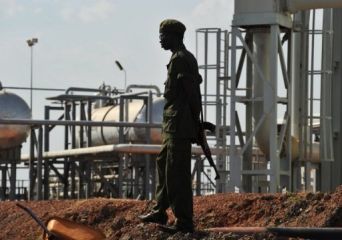Sudan ruling party reiterate its demand for security before oil exportation
August 8, 2012 (KHARTOUM) – Sudan’s ruling National Congress Party reiterated that oil deal with South Sudan cannot be implemented without a comprehensive agreement over the remaining unresolved issues, particularly the security matters.

Wednesday’s high level meeting was briefed by Sudan’s top negotiator Idris Mohamad Abdel-Gadir, about the details of the oil transportations fees deal and the progress made over the remaining pending matters.
Speaking to the media after the meeting, NCP spokesperson Badr-Eldin Ahmed Ibrahim said foreign pressures forced South Sudanese government to the oil deal. He further said that oil transit through the Sudanese pipelines would start only after an agreement over the implementation of security arrangements.
“If the South Sudanese government is keen to export its oil production though the Sudanese pipelines, the security file should be integrally resolved including the disengagement with the northern sector (SPLM-N), the expulsion of the armed movements, the withdrawal of the ninth and tenth (SPLM) divisions (from South Kordofan and Blue Nile) and the demarcation of the border”, he said.
The official did not raise Sudan’s refusal to operationalise a twenty-kilometre demilitarised zone on the common border because the mediation included a territory Khartoum refuses to consider it as disputed area.
South Sudan ruling party, SPLM, denies harbouring or supporting Sudanese rebel groups from Darfur, Blue Nile or South Kordofan. But it admits some sympathy and solidarity with its former members in Sudan. Juba also says it broke its links with the fighters of SPLM-North since its independence, but Khartoum keeps accusing Juba of supporting them.
Badr-Eldin expected that the resolution of security matters will impact positively the political settlement of the conflict in South Kordofan and Blue Nile.
He said that Khartoum always called on Juba to distance itself from the rebel groups but it only responded to international pressures. He added that the “circumstances” forced Juba to reach an agreement on oil issues but this was not “its natural will”.
The NCP official was alluding to the different attempts carried by South Sudanese government to build borrow money from foreign investors and countries to fund its expenditures and construction of a new pipeline through Kenya during the past months.
He however pointed out that the reached deal gives some positive signs on the upcoming talks.
“As long as the South Sudan agreed to the continuation of oil (exportation through the Sudan) this implicitly means they acknowledge the error they committed when they decided to stop it”, he said.
He went further to say that “their approval of the (oil) agreement means they accept security arrangements and we expect to resolve all the issues and reach a political settlement after the Eid al-Fitr”, he pointed out.
Sudan and South Sudan transportation fees deal provides Juba will pay Khartoum $11 per barrel for the crude produced in Unity state and $9.10 for the oil of Upper Nile state. But this exceptional rates will only last for three and a half year.
Another agreement can be reached if Juba intends to continue exporting its production through the Sudanese territory.
Pagan Amum, South Sudan top negotiator, announced last week that Juba “has already decided to construct an alternative pipeline, which will be up and running by then.”
The different feasibility studies about the funding of a new pipeline have shown that it would not be profitable for investors. But such decision can be politically motivated, analysts say.
(ST)
